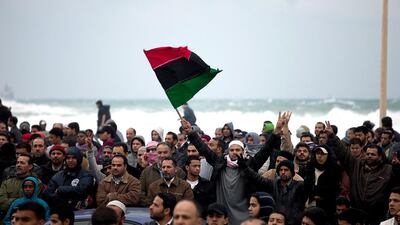Five years ago, after the Tunisian and Egyptian uprisings, I was sitting in Cairo, wondering if Libya would follow suit. A part of me wished it wouldn’t. Not because the people of Libya didn’t deserve the chance to decide their own futures – they did. But the cost could be dear – and it was.
Libyans, for years, had tolerated and suffered the rule of a man who overthrew a monarch who was instrumental in bringing the modern state of Libya into being. King Idris was not perfect, but he established the beginning of institutions that could have been developed, turning Libya into one of the leading states of the Arab world.
The constitution he promulgated was placed on the shelf, replaced by Muammar Qaddafi's Green Book – a non-philosophy which no one misses. In contrast, the constitution of 1951 remains a great inspiration to many in Libya to this day while a new constitution is being written.
On February 17, Libyans should have been in a position to remember the sacrifices of their martyrs, standing in the international community as a symbol of what a free people can do against tyranny.
Instead, the country has been the subject of much internecine conflict, with different forces within it being manipulated as proxies of regional powers. One group of Libyans is celebrating not the liberation of the country from tyrannical rule, but the taking of one of its cities, Derna, by forces aligned to ISIL – hardly the sort of commemoration anyone should be noting with pleasure.
For far too long, Libyans have been left to the wayside of the international community’s scope of concern – and as a result, their country has been allowed to tear itself almost apart. It has only been the perseverance of some Libyans that has held the country together, while in other circumstances it might have disintegrated entirely. But their resolve cannot be left unaided any longer. Libyans have already sacrificed so very much and the international community has to live up to its responsibilities.
What happens in Libya does not simply stay in Libya. The breakdown of order has repercussions for countries on its borders who rightly fear the spillover of instability and militancy that has already cost many lives. But the repercussions could extend further. Libya is not so far from Europe, and the possibility of even more refugees heading north across the Mediterranean cannot be discounted.
When it comes to ISIL, Libya was underestimated for a long time. That was a mistake. ISIL sees the country as a natural next launching pad – and this extremist organisation cannot be allowed to scavenge Libya for its own nefarious designs.
Nor can dissent within the country be interpreted solely through the lens of counter-terrorism, as though all of the people on one side are fighting terrorism and all those on the other be described as terrorists. The splits among Libyans cannot be permitted to be instrumentalised externally for partisan gains – that only leads to more conflict and strife for every Libyan.
The weight of regional forces and international powers should be used for only two things: to bring Libyans together to build their country together on a solid footing, and to ensure ISIL is dealt a crippling blow. Not so that ISIL is contained, but so that it is removed from the lives of Libyans.
That will mean the creation, and then strengthening of Libyan institutions – for all Libyans, and not for one group at the expense of others. Libya has been through a great trauma and it urgently needs healing. Transitional justice is not an optional luxury for Libyans, it is as dire a security need as any other.
Security sector reform, including the removal of the gun from politics, is likewise a necessary step that Libyans must traverse. But that can only take place with a consensus-driven process for Libyans to build their state. Those willing to engage in that internally, and those willing to assist in that from the outside, ought to be considered as welcome. Those who are not should be considered at the very least as obstacles to a better future for Libya. At worst, they are liabilities for the stability of the Libyan state.
Much has happened in the past five years; there have been many sacrifices. But the spirit of Omar Al Mukhtar, the Libyan resistance leader against Italian fascism and colonisation, was present in that uprising in 2011. His spirit, and the spirit of so many who gave their lives, must be respected.
The promise of the Libyan revolution remains, even if fulfilling it remains a task of massive proportions. But that promise remains every Libyan’s right, and far better than anything else on offer.
Dr HA Hellyer is an associate fellow at the Royal United Services Institute in London, and a non-resident senior fellow at the Rafik Hariri Centre for the Middle East at the Atlantic Council in Washington, DC
On Twitter: @hahellyer


